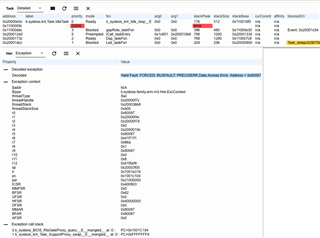Other Parts Discussed in Thread: SYSBIOS
Hi team,
SDK : 5.30.00.03
Base project : simple_peripheral_oad_offchip
SNV Sector = 1
Cache_AS_RAM = TRUE
I am facing a problem when the SNV page is full. When it is full and I try perform a write operation, the program throws an exception and hangs forever. I think the page is erased after the writing because the data of SNV page is all 0xFFFFFFFF.
The exception is the following: "Hard Fault: FORCED: BUSFAULT: PRECISERR.Data Access Error. Address = 0x80087"
Exception call stack :
0 ti_sysbios_BIOS_RtsGateProxy_query__E__mangled__ at :0 :": "PC=0x1001C104
1 ti_sysbios_knl_Task_SupportProxy_swap__E__mangled__ at :0 :": "PC=0xFFFFFFF9
Below additional data about tasks, hwi, heap metrics and heap stats.


Please, can anyone provide me some direction for solving that problem?
Thanks in advanced.

